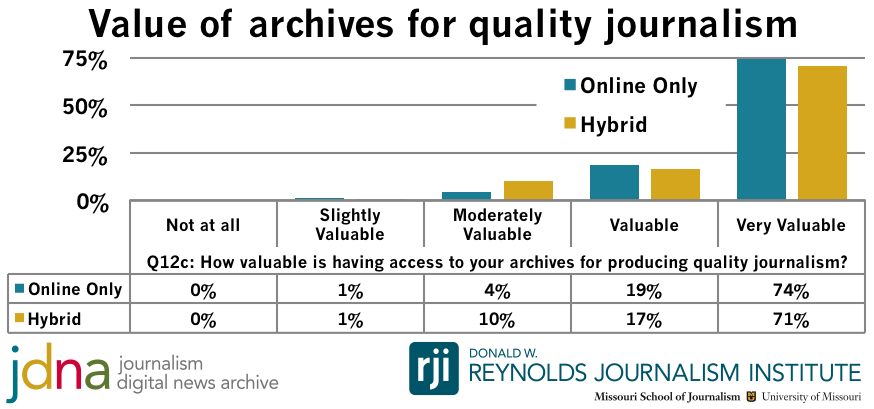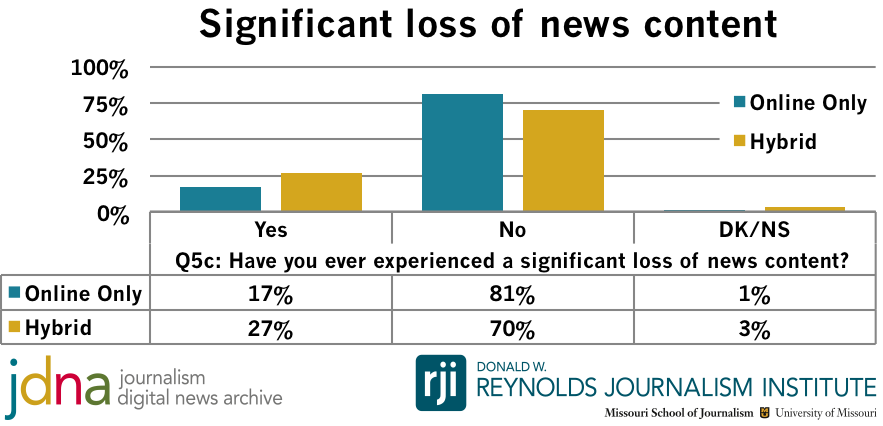
Saving the news: When your server crashes, you could lose decades of digital news content — forever
In 2002, the Columbia Missourian suffered a server crash. The Missourian backups were held in an obsolete version of a content management system. In less than a second, the newspaper’s digital archive of 15 years of stories and 7 years of photojournalism were gone forever.
All digital news content is fragile and subject to loss: computer systems will crash; all storage media will eventually fail; software applications and formats will continue to evolve; natural disasters are inevitable; human beings will make mistakes.
The stakes of such potential loss are high. The ability to quickly access and integrate fact-checked and authentic news accounts into breaking stories or investigative reporting separates real journalism from fluff. News archives serve as a form of institutional knowledge allowing newer staff members to understand and convey the historical context of their stories to the readership. It is difficult to calculate the full value of news archives given the countless hours of reporting and editing they distill, not to mention the treasure they represent in terms of their community’s cultural heritage.

Newly released survey information from the Journalism Digital News Archive (JDNA) initiative of the Donald W. Reynolds Journalism Institute (RJI) confirms that news libraries are highly prized by news organizations for the value they bring for producing quality journalism.
When questioned, 93 percent of Online Only news organizations said that news archives were either valuable or very valuable for their operations. Hybrid enterprises, which publish in print and on the Web, indicated an 88 percent agreement in their response to those same categories.
The Missourian is not alone in its loss of born-digital news content. The term born-digital denotes data that originated from an electronic device; it was not scanned or captured from an analog state such as print on paper, photochemical photographs or magnetic audio or video tapes.

The JDNA/RJI survey indicates that 27 percent of Hybrid news producers have experienced a significant loss of content, while 17 percent of Online Only organizations have encountered this kind of damage.
The consequences of archival system failure are heavy, said Tom Warhover, executive editor for innovation at the Columbia Missourian: “You can’t offer up a comprehensive product to sell — your archives — if they aren’t complete. You can’t be sure you’ve really vetted a candidate for school board or city council. You can’t find those historical pieces from events that now are historic and worth reporting again on anniversaries.”
In response to the panoply of threats facing digital news content, RJI launched the JDNA initiative in 2013 and will host “Dodging the Memory Hole: Saving Born-digital News” forum Nov. 10-11. Made possible by grants from The Mizzou Advantage and RJI, the forum will bring together journalists, historians, genealogists, entrepreneurs, business leaders, legal experts and others stakeholders to focus on a national action agenda for born-digital news preservation and access.
The recent RJI/JDNA survey is a response to the fact that very little is known about the policies and practices of news organizations when it comes to born-digital content. The phone survey of 476 news organizations took place between April 24 and May 21, 2014, in part to prepare for the November forum. Thus far journalists, the creators and holders of news content have largely been absent from the decisions about if and how their work will survive. More information about the 2014 Dodging the Memory Hole forum is available here.
JDNA’s goal is to improve preservation and access to news content that originated in digital format. JDNA’s approach to the dilemma of preserving born-digital news content is multi-faceted, recognizing that there are a variety of stakeholders who may be affected by the fate of what has been called “a first rough draft of history.”
See also: Preserving Born Digital News at Digital Preservation 2014 by Anne Wootton, Edward McCain, Leslie Johnston and Aurelia Moser.
Comments